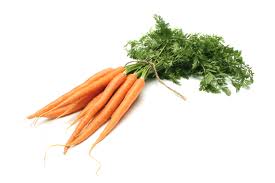 The carrot, perhaps the most widely used root vegetable in the world, is thought to have originated in Afghanistan, since this region of the world has the highest diversity of carrots. From here, the carrot made its way to Turkey, where it was widely distributed along the spice route. Popular from East Asia to Western Europe, the importance and popularity of this vegetable cannot be understated.
The carrot, perhaps the most widely used root vegetable in the world, is thought to have originated in Afghanistan, since this region of the world has the highest diversity of carrots. From here, the carrot made its way to Turkey, where it was widely distributed along the spice route. Popular from East Asia to Western Europe, the importance and popularity of this vegetable cannot be understated.
While the most common color of carrot is orange, a number of colored carrot varieties can be found around the world today. White, yellow and purple carrots are just a few such examples. Carrots, which grow in the soil, enjoy cooler climates and typically have two harvests per year. The early spring planting tends to mature by midsummer, while the midsummer planting tends to mature by the early fall. As a root vegetable which stores very well, you can find carrots in the middle of the winter in any market in the United States and beyond.
Key Nutrients
Carrots provide a high amount of vitamin A, beta carotene, vitamin K, potassium and thiamine. Carrots provide a high degree of dietary fiber, especially when consumed raw.
Health Benefits
Dietary Fiber – Dietary Fiber stimulates digestion and peristalsis, helping to relieve indigestion and constipation problems.
Beta Carotene – Beta carotene has been well-studied as a dietary antioxidant. Carotenoids are also thought to benefit eye health. Some studies support a role of carotenoids in reducing macular degeneration.
Vitamin K – Vitamin-K plays an important role in bone metabolism by promoting osteotrophic activity in bone cells. Vitamin K also acts to clot open wounds and prevent excessive bleeding. Healthy vitamin K levels lower the release of the glycoprotein interleukin-6, a marker of inflammation within the body.
Vitamin A – Vitamin A, when converted into retinaldehyde, is a vital compound for healthy eyes. Furthermore, vitamin A is believed to fight against cataracts, macular degeneration and glaucoma. Vitamin A strengthens the membranes of the human body such as mucous membranes, respiratory, urinary and intestinal tracts. It is also essential for the lymphocytes, or white blood cells, that fight infection once in the body.
Potassium – Potassium is an essential mineral which aids in fluid regulation, protein synthesis and cardiovascular health. High levels of potassium are associated with reduced risk for stroke, improved blood pressure control as well as bone health.
Vitamin B1 – Thiamine is an important vitamin since it breaks down sugars in the body. Thiamine also helps to support nerve and heart health.
Season
Carrots are commercially produced in both North and Southern climates, making this root vegetable available year round.
Nutrition Information
Per 1 cup (130 grams):
Calories (cKal): 52
Protein (grams): 1.19
Total Fat (grams): .31
Carbohydrates (grams): 12.26
Fiber (grams): 3.6
Buying and Storing
When buying carrots, try to avoid tubers which are covered in a white powder, since this tends to demonstrate prolonged storage and age. Instead, buy carrots which are bright in color and crisp to the touch. When storing, a carrot can last for up to one month when placed in a cool, dry place. In the refrigerator, store your carrots for up to two weeks, making sure to remove any green leafs which are attached before storage. When ready to use, was the carrot under cold water for at least thirty seconds, and peel to remove any additional soil or bacteria.
Best Way to Add to Diet
Carrots are a wonderful vegetable served raw, cooked or pureed. When eating raw carrots, make sure to wash the carrot under water for at least thirty seconds. Additionally, make sure to peel the carrots before consuming raw. When cooking carrots, a great way to enjoy this root vegetable is to steam them in boiling water for five minutes, or until tender. Add a bit of orange juice to the boiling liquid for a bit of extra flavor. Carrots taste great sliced and sautéed in a bit of olive oil. If you would like to make a puree, simply place some cooked carrots in a blender along with a small amount of cooking liquid. Blend unitl a puree forms, around two minutes.
Carrot Recipe

 Not Sure What Healthy Foods To Eat?
Not Sure What Healthy Foods To Eat? This week we take a look at one of my favorite healthy foods...the mighty Avocado.
This week we take a look at one of my favorite healthy foods...the mighty Avocado.
No comments yet.